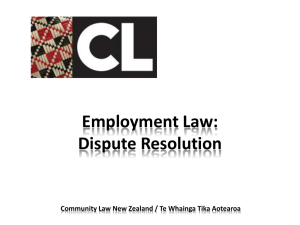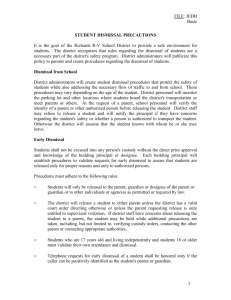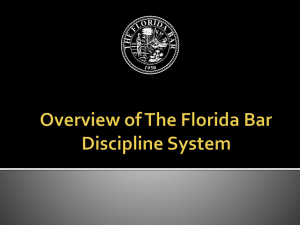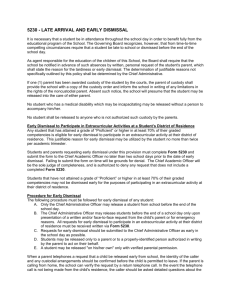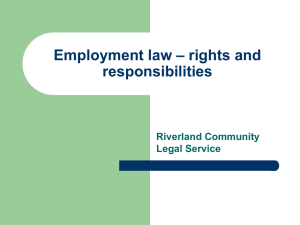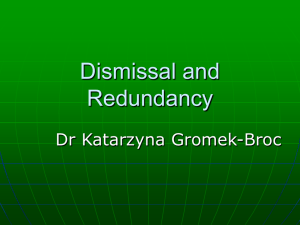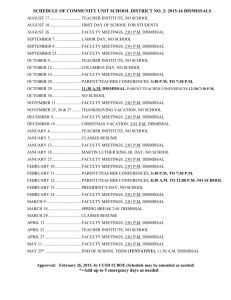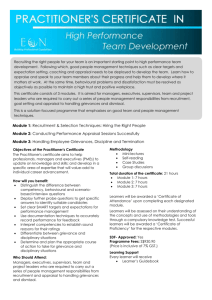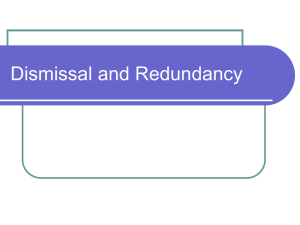1545 - Personnel Policy Provisions
advertisement
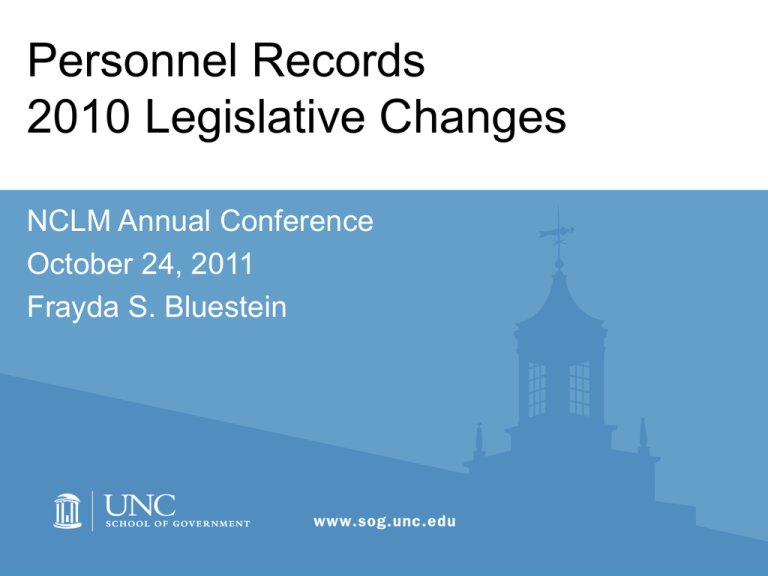
Personnel Records 2010 Legislative Changes NCLM Annual Conference October 24, 2011 Frayda S. Bluestein Session Goals • Review Legislative Changes • Review AG Opinion Key Conclusions • Discuss Current Approaches in Practice for Implementation/Interpretation Public Employee Records Public Records Act Most records of public agencies are public Exception: Personnel Privacy Statutes Most public employee records are not public Exception to the exception: Personnel Privacy Statutes Specific employee information is public Information That is Now Public Effective Oct. 1, 2010 • Date and amount of each increase or decrease in salary • Date and type of each promotion, demotion, transfer, suspension, separation, or other change in position classification • Date and general description of reasons for each promotion Information That is Now Public Effective Oct. 1, 2010 • If the disciplinary action was a dismissal, a copy of the written notice of the final decision…setting forth the specific acts or omissions that are the basis of the dismissal. Key conclusions: Salary history and position change information that exists is public. Notices of dismissal and reasons for promotion that exist are public. Public Employers must create notices of dismissal and reasons for promotion for all employees for actions taken on or after October 1, 2010. Records vs. Information • Note: Personnel privacy law specially requires release of information. • Does not follow the usual rule that agencies are not required to create records. NCLM Annual Conference October 24, 2011 Hope A. Root Senior Assistant City Attorney Charlotte, NC The “written notice of the final decision…setting forth the specific acts or omissions that are the basis of the dismissal” (2010 amendments) After grievance has been fully heard. If no grievance filed, after period for filing has expired and final decision has been written. Management memos regarding investigation leading up to decision to terminate are not a matter of public record. Not a final decision. Likely contains information that is not a matter of public record. Employer should not incorporate by reference without considering impact. Review documents for information that remains confidential despite changes to personnel records legislation. Redact confidential information Examples: ◦ ◦ ◦ ◦ ◦ Other employees’ personnel records FMLA ADA HIPAA NC Identity Theft Act Employee Smith was terminated for poor performance. Termination letter stated that Smith had been previously suspended on three separate occasions for (1) workplace violence against Employee Jones; (2) failure to follow attendance rules; and (3) abuse of the FMLA policy when Smith was supposed to be taking care of his disabled child and he was actually hiking the Appalachian Trail. Employee is terminated for falsification of work documents. Employee immediately goes to the press and says “City terminated me in retaliation for speaking out against Management to City Council.” Can release termination letter, but not until grievance has been heard or grievance period has expired. Not a dismissal; therefore, documents not public record. Wait until grievance heard or grievance opportunity expired before giving out information that resignation occurred. May or may not be a position classification change Demotion, Transfer, Resignation, Suspension, Separation, etc. Currently, only dismissal requires release of a supporting document. Although at-will employment remains, the fact that the dismissal letter will become public gives the employee a right to a nameclearing hearing. Effect: ◦ Creates employee right to hearing before final termination, which did not previously exist. ◦ Employee remains on employment books until after hearing and grievance process complete. ◦ Cost to City – Time and Resources Media request: Names of all members of police recruit classes for last 6 years, and salaries broken down by regular and overtime for each. Disciplinary actions taken against all police officers in last 5 years, including type of actions and, for dismissals, the final decision setting forth the specific acts and omissions that were the reasons for the dismissal.” Response to Media Request: ◦ Accumulate data in timely manner ◦ Redact confidential information – Records that were created before the statutory amendment were written as confidential, and may include information outside of the scope of the statute ◦ “Type” of suspension? Legislative amendments did not affect applicants. Information about applicants for employment is never public record ◦ Statute includes applicant records as being private ◦ Statute does NOT include applicant records in the list of information that is public record. Before hiring, tell applicant what information will be pubic record, including age, salary, etc., as well as demotions, suspensions, and details if dismissal. Employee may resign rather than have dismissal document become public record. After the requisite time has expired, City can explain why Employee was terminated.
